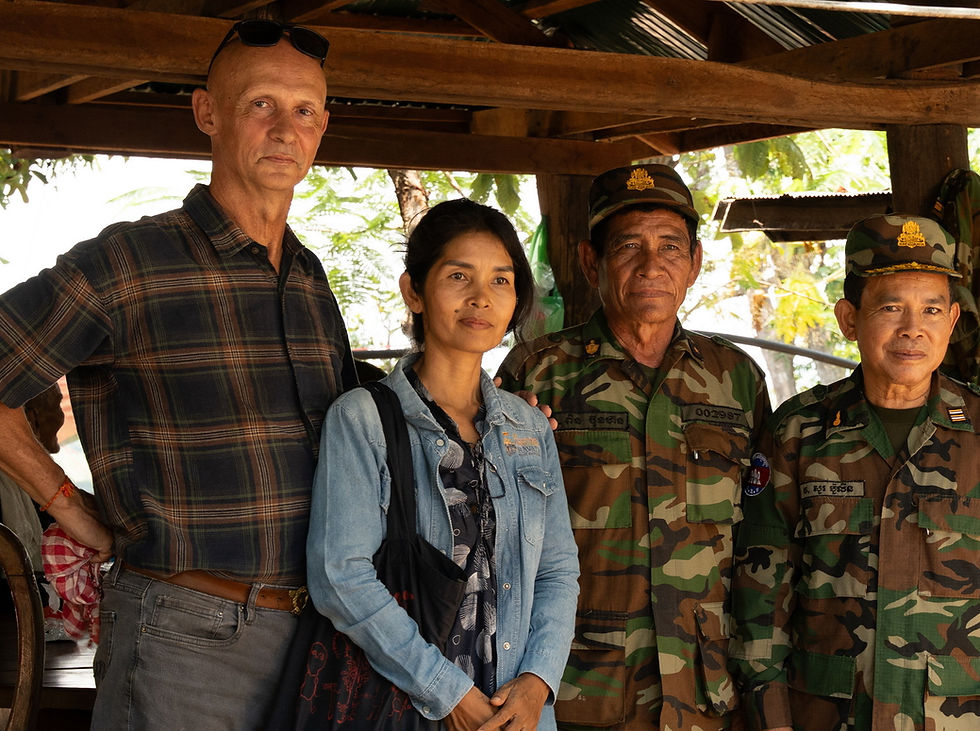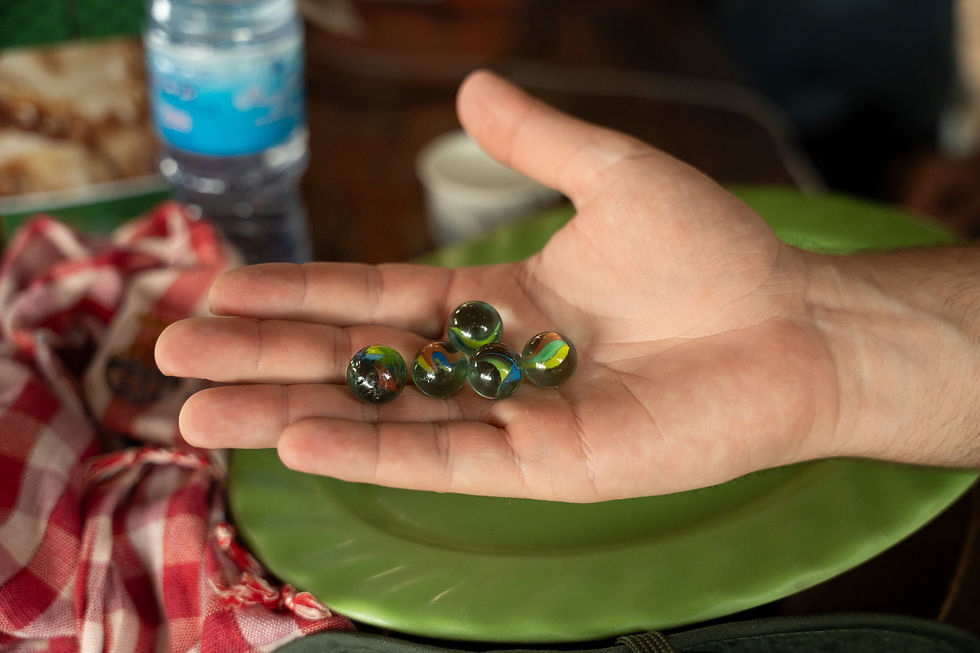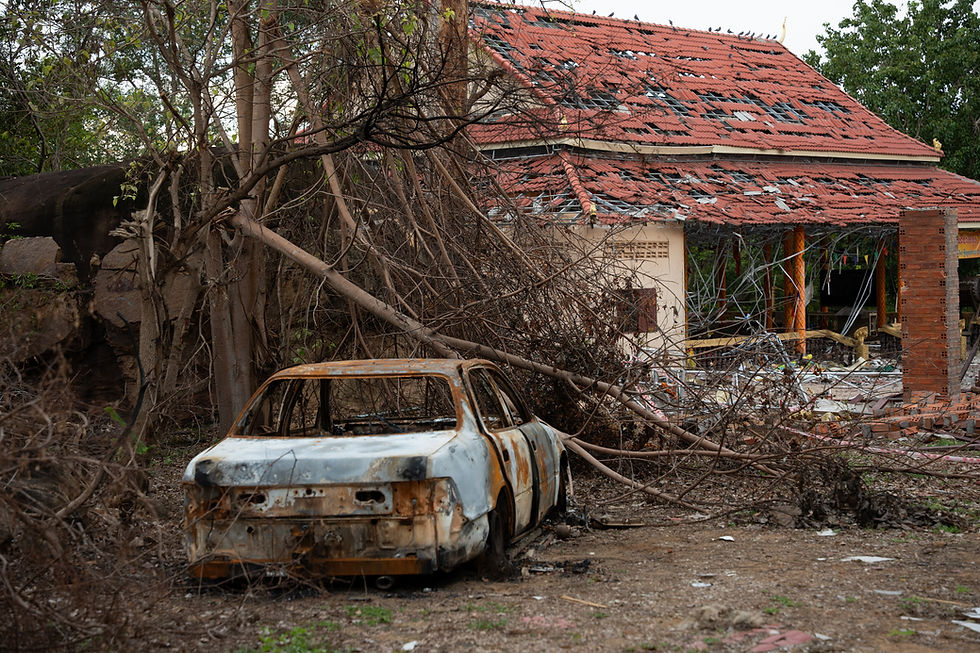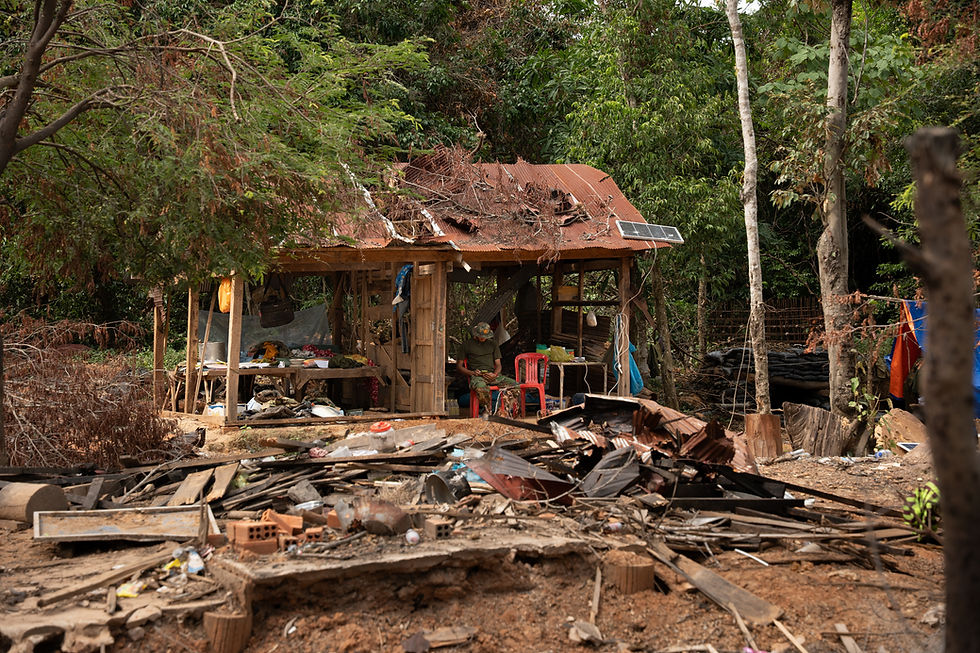Cambodia & Reportage: On the front line facing Thai aggression
- Chroniqueur

- Aug 18, 2025
- 4 min read
Living in Ratanakiri in north-eastern Cambodia, our family's daily life revolves around hospitality, elephants, the forest and conservation projects. But when war comes knocking at the country's door, it is of course difficult to remain indifferent. The Airavata Foundation is not just about elephants: it is also a commitment to Cambodia, its people, its culture and its history.

So, with the support of Urgence Humanitaire, a small French NGO engaged in direct and targeted actions to help people in distress, we set off for the Thai border.
The land of temples under bombardment
Coming from Siem Reap, the road to Oddar Meanchey initially offered a few signs of hope: dozens of families were returning to their villages in carts, and we greeted each other cheerfully with a hearty ‘Cheyo Kampuchea!’.
When we arrived in the provincial capital, we were quickly brought back to reality by the vice-governor's welcome: we are taken to a command post that is completely devoid of supplies, lacking camouflage nets, anti-drone protection, tarpaulins and almost no trenches. It is clear that Cambodia did not want or even prepare for this war...
We distribute most of our medicines and food, which are shared among all the troops present.

On the outskirts of a small, disputed Angkorian temple, F-16s ploughed the ground with craters 20 metres wide and three metres deep, destroying everything in their path. Cambodian soldiers, disarmed out of respect for the ceasefire, live among the ruins. Their equipment is modest, but their determination is palpable. They speak solemnly of their dead, and the elders tell us that the fighting was five times more intense than in 2011.

The war against civilians
At the sacred pagoda of Prasat Ta Moan Thom Senchey, an achar (pagoda assistant) tells us how he survived by hiding among the rocks, while an elderly man, slower to react, was blown to pieces.
Laser-guided bombs do not make mistakes: deliberately targeting a known religious site is organised terror, intended to empty an area of its population.

The same scenario is repeated at the neighbouring clinic, which was destroyed to prevent the wounded from receiving care. This is a scorched earth policy, a cowardly and cynical strategy aimed at conquering land by driving away the population.
Refugees, living memories of suffering
At the Pagoda of 5,000 Banyan Trees, entire families have been camping for two months, unable to return home. The many wives of soldiers live in constant anguish, torn between pride in their husbands' commitment and nervous exhaustion.
Some, already poor before the war, have nothing left here and are often too shy to ask for help, floundering endlessly in this sea of sticky mud where even the strongest characters would sink.

Among the refugees is a very old grandmother, a skeletal figure of the Cambodian tragedies, who claims to be 105 years old. Bedridden and suffering from chest pains, she receives with great emotion the few medicines, supplies and provisions that we buy with funds from the NGO. Her poor smile comforts us, but this ordeal has left a deep impression on all of us.
As a former peacekeeper in Cambodia, I witnessed the return of refugees from Thai camps in 1992, but that was a joyful event marking the end of thirty years of conflict. In 2025, it is a neighbouring country, modern and developed, that plunges us back into a horror reminiscent of the Khmer Rouge. It is a very bitter step backwards.
A country of peace facing a war machine
For thirty years now, Cambodia has turned the page on conflict and invested in its development, not in weapons. Opposite it, Thailand, fuelled by decades of militarism, is looking for a pretext to use its expensive ‘toys of death’ against a neighbour from whom it has already amputated numerous territories over the centuries.

On the ground, nothing has been resolved. Thai forces are testing, provoking, violating the ceasefire, and saturating the media with disinformation. Their objective is clear: to crush the small Cambodian army (ranked 95th in the world) with all the might of their own (ranked 25th in the world), in order to divert the attention of the Thai people, who must continue to ignore the internal political problems and repeated scandals that tarnish their leaders.
Cambodia did not choose this war.
Faced with the brutality of an arrogant and vengeful neighbour, it can only oppose the dignity of its people, the strength of its memory and its respect for international law.
Unfortunately, this is very little in the face of a modern army with 92 combat aircraft and generals who are eager to continue this unequal fight to go down in history.

As long as the world remains silent, the small kingdom will remain vulnerable to the brutality of its powerful neighbour, capable at any moment of reopening the gates of hell.

Photo report by Jean-Clais
On the front line: Chenda and PY Clais







Comments